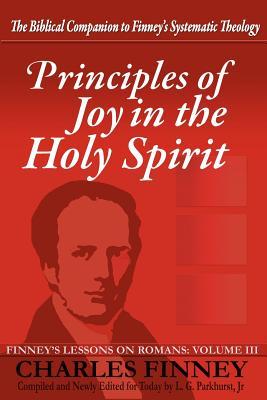- Bible
- Read the Bible
- Bible Versions
- Verse of the Day
- Reading Plans
- Verses by Topic
- Books of the Bible
- Bible Images
- Study
- Commentaries
- Concordances
- Dictionaries
- Encyclopedias
- Sermons
- Bible Atlas & Maps
- BP Wiki
- Devotionals
- Today's Devotionals
- Light of the World
- All Devotionals
- Inspirational Quotes
- More
- Picture Quotes
- Videos
- Inspirational
- Bible Study
- What The Bible Says
- Bible Q&As
- Daily Bread
- Bible by Genre
- Bible Stories
- Random Bible Verse
- Community
- Store
Principles of Joy in the Holy Spirit: Finney's Lessons on Romans, Volume III
by Charles G. Finney
The Letter to the Romans stands as Paul's most significant message on how to begin and maintain a loving relationship with God and others. The Holy Spirit often leads those seeking to understand the essentials of saving and sanctifying faith to read Romans. Beginning with Charles G. Finney's Principles of Righteousness, Volume I, continuing with Principles of Peace, Volume II, and concluding with his Principles of Joy in the Holy Spirit, Volume III, this three-volume set of Finney's Lessons on Romans presents an authoritative collection of Finney's teachings on how to live for Jesus Christ in the power of the Holy Spirit. Finney's Lessons on Romans also provide a solid Biblical foundation for those who want to understand better Finney's Systematic Theology. In this new Finney's Principles Series set, the addition of Study Questions for individuals and groups by the editor and the Commentary on Romans by Henry Cowles, a fellow professor with Finney at Oberlin College, will help you apply and remember the principles contained in Finney's lectures and sermons on Romans. Charles G. Finney became the greatest American preacher and theologian of the Nineteenth-Century. He traveled widely as an evangelist and revivalist in America and abroad, served settled pastorates, taught as a professor of theology, promoted the abolition of slavery and equal rights, and helped found and served as President of Oberlin College in Ohio. Just as one cannot understand the Great Awakening without studying Jonathan Edwards, one cannot understand the great revivals and the theological and social reform movements in Nineteenth-Century America without studying Charles G. Finney. Because Finney's teachings remained true to the Bible and common sense, his message transformed thousands and continues to ring true in the hearts and minds of God's people.
Paperback, 260 pages
Published July 9th 2012 by Agion Press
© 2025 Bibleportal.com All rights reserved.

Charles Finney (1792 - 1875)
Known as one of the leaders in the Second Great Awakening revival in America. He was a revivalist who called for deep introspection of sin and preaching of the law to bring about sin. He was known to preach 30+ nights on sin and than the last night on Christ to have people flee to Him for mercy. Used greatly in the book: "Revivals of Religion" which is a classic on the subject of revival.He preached on the true Baptism of the Holy Spirit and its necessity. In his revivalistic campaigns he was used of the Lord to bring some estimate over 50,000 souls to the Lord which many were sound converts. There has been questions raised surrounding his theology in the later years of his ministry but this does not discredit that God used him powerfully in revival and for God's kingdom.
Charles Finney was born in Connecticut to an ordinary family and life that gave little hint of the great things God had in store for him. He was a schoolteacher and then a lawyer before his conversion at age 29. Finney was filled with the Holy Spirit on the same day he was saved and immediately began witnessing to friends and family members. More than twenty people were saved in the 24 hours following Finney's conversion. Finney's personal evangelism soon became public evangelism as he began to travel and preach in extended revival meetings. He considered revival to be a natural result of following the instructions God had laid out in His Word.
During Finney's fifty years of preaching, more than 500,000 were saved. He wrote many books, the most enduring of which are The Autobiography of Charles Finney and Lectures on Revival of Religion. After ill health forced him to stop traveling in meetings, he accepted the pastorate of a church in New York City. From 1852 until 1866 he served as president of Oberlin College in Ohio. Although some of his theology was lacking, he was a powerful, Spirit-filled soul winner who brought revival to cities and towns across the eastern United States.
... Show more